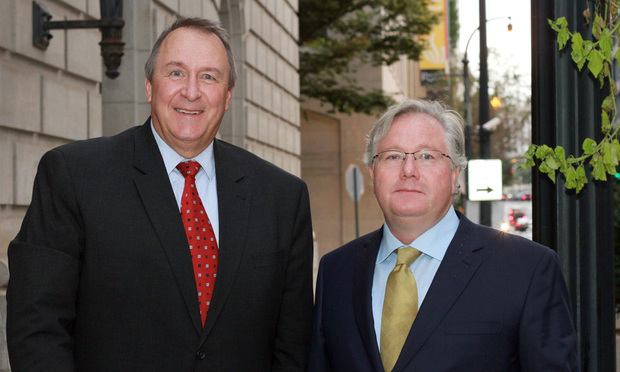11th Circuit Considers Whether to Reinstate Auto Insurance Price-Fixing Claims
The en banc hearing comes after a split panel opted to reinstate the case after it was tossed for failure to state a claim.
October 24, 2018 at 12:23 PM
5 minute read
 Mark Shurtleff (left) and John Eaves (Photo: John Disney/ALM)
Mark Shurtleff (left) and John Eaves (Photo: John Disney/ALM)
The U.S. Court of Appeals for the Eleventh Circuit heard arguments Tuesday leveled by a group of auto-body repair shops claiming State Farm Insurance and a host of other national carriers are conspiring to fix prices.
The plaintiffs say the insurers have conspired to drive down the prices they're charged for repair services by agreeing among themselves to pay a preset “market rate” and to enforce compliance by “steering” their insureds to businesses that play ball, effectively boycotting other shops.
In addition to State Farm, the defendants include Allstate, Progressive, Geico, Nationwide, USAA, Liberty Mutual and Hartford, among others.
Sitting en banc, the judges were considering whether to keep alive multidistrict litigation that was tossed out by a district judge for failure to state a claim, then revived by a split panel last year.
The cases have been combined in Florida's Middle District, and the instant appeals represent five of 14 similar complaints combined in the action. The body shops in the MDL are in Kentucky, Missouri, New Jersey and Virginia.
Although there are certain variations in the individual complaints, in general they allege the insurers have all agreed to follow a market rate established by State Farm, which is accused of using a method of ranking body shops by criteria, including number of employees, number of work bays and area density, which it then “manipulates” as it solicits businesses to be part of its direct repair program.
If a body shop in the program tries to charge rates higher than those demanded by State Farm, they are met with an “ongoing pattern of coercion and implied threats” to enforce compliance, according to court filings.
Shops not complying are dropped from the program, and customers are “steered” away by the insurer.
In 2016, the five complaints at issue were dismissed for failure to state a claim, but a split panel reversed that ruling last year. The majority opinion was written by Judge Charles Wilson with the concurrence of Washington Western District Judge Barbara Rothstein, sitting by designation. Judge R. Lanier Anderson dissented.
According to Wilson's opinion, the complaints claimed that State Farm and the other defendants used unverified and manipulated market rates to depress costs.
“They use tactics such as requiring a body shop to repair a faulty part rather than installing a replacement part, even when the shop strongly recommends against continued use of the faulty part; requiring a shop to install a used or recycled part, even when a new part is available and would be best; and requiring a shop to offer discounts and concessions, even if doing so will force the shop to operate at a loss,” Wilson wrote.
The opinion noted that claims of horizontal price fixing based on inferred agreements rather than evidence of such deals must be bolstered by other evidence, or “plus factors.” Among those cited by the plaintiffs were routine notices from the other insurers that they would not pay any more for repair work than State Farm paid.
Anderson said in a dissent that he agreed the described behavior might be “objectionable,” but that didn't make it illegal.
“With regard to the antitrust claims,” he wrote, “binding case law indicates to me that the allegations of these complaints do not give rise to the necessary reasonable inference of agreement or conspiracy and, therefore, fail to state a claim.”
On Tuesday, attorney Mark Shurtleff represented the lead plaintiff, Quality Auto Painting Center of Roselle Inc., along with colleague John Eaves of John Arthur Eaves Law Offices in Jackson, Mississippi.
Shurtleff began by arguing that the complaining body shops were acting in the best interest of their customers, while “the others” loyalties lie with the insurance companies.”
Several judges were skeptical, with Chief Judge Ed Carnes asking how the insurance companies' behavior in matching each others' rates was any different from other businesses.
“It happens in about every case,” said Carnes. “One raises it, they all raise it.”
Shurtleff pointed to the “uniformity of prices” demanded by the insurers, noting that uncooperative body shops were targeted for criticism and boycotted.
Judge Stanley Marcus wondered whether commonplace business activity, such as an insurer recommending one shop and disclaiming another, was enough to “nudge your case across the line” into illegal price fixing.
Under questioning, Shurtleff agreed that the insurers did not necessarily prohibit their policyholders from utilizing a particular shop and that simply showing that the prices demanded by State Farm and then demanded by other carriers did not necessarily prove collusion in itself.
The insurers were represented by three lawyers: Alston & Bird partner Michael Kenney for State Farm, Dentons partner Rick Fenton for Allstate, and Daniel Goldfine of Lewis Roca Rothgerber Christie for Geico.
The defense lawyers argued there was no direct evidence showing the insurers' alleged action constituted price-fixing, and urged the judges to hew closely to the U.S. Supreme Court's 2007 decision in Bell Atl. Corp. v. Twombly.
That decision toughened the standards for bringing price-fixing claims and established that a simple showing of “parallel conduct” was, without evidence of an an actual agreement, insufficient to support such claims.
“There is no way here to show that what is alleged is anti-competitive activity,” Kenney said.
This content has been archived. It is available through our partners, LexisNexis® and Bloomberg Law.
To view this content, please continue to their sites.
Not a Lexis Subscriber?
Subscribe Now
Not a Bloomberg Law Subscriber?
Subscribe Now
NOT FOR REPRINT
© 2025 ALM Global, LLC, All Rights Reserved. Request academic re-use from www.copyright.com. All other uses, submit a request to [email protected]. For more information visit Asset & Logo Licensing.
You Might Like
View All


Plaintiffs Attorneys Awarded $113K on $1 Judgment in Noise Ordinance Dispute
4 minute read
'Didn't Notice Patient Wasn't Breathing': $13.7M Verdict Against Anesthesiologists
12 minute readTrending Stories
Who Got The Work
J. Brugh Lower of Gibbons has entered an appearance for industrial equipment supplier Devco Corporation in a pending trademark infringement lawsuit. The suit, accusing the defendant of selling knock-off Graco products, was filed Dec. 18 in New Jersey District Court by Rivkin Radler on behalf of Graco Inc. and Graco Minnesota. The case, assigned to U.S. District Judge Zahid N. Quraishi, is 3:24-cv-11294, Graco Inc. et al v. Devco Corporation.
Who Got The Work
Rebecca Maller-Stein and Kent A. Yalowitz of Arnold & Porter Kaye Scholer have entered their appearances for Hanaco Venture Capital and its executives, Lior Prosor and David Frankel, in a pending securities lawsuit. The action, filed on Dec. 24 in New York Southern District Court by Zell, Aron & Co. on behalf of Goldeneye Advisors, accuses the defendants of negligently and fraudulently managing the plaintiff's $1 million investment. The case, assigned to U.S. District Judge Vernon S. Broderick, is 1:24-cv-09918, Goldeneye Advisors, LLC v. Hanaco Venture Capital, Ltd. et al.
Who Got The Work
Attorneys from A&O Shearman has stepped in as defense counsel for Toronto-Dominion Bank and other defendants in a pending securities class action. The suit, filed Dec. 11 in New York Southern District Court by Bleichmar Fonti & Auld, accuses the defendants of concealing the bank's 'pervasive' deficiencies in regards to its compliance with the Bank Secrecy Act and the quality of its anti-money laundering controls. The case, assigned to U.S. District Judge Arun Subramanian, is 1:24-cv-09445, Gonzalez v. The Toronto-Dominion Bank et al.
Who Got The Work
Crown Castle International, a Pennsylvania company providing shared communications infrastructure, has turned to Luke D. Wolf of Gordon Rees Scully Mansukhani to fend off a pending breach-of-contract lawsuit. The court action, filed Nov. 25 in Michigan Eastern District Court by Hooper Hathaway PC on behalf of The Town Residences LLC, accuses Crown Castle of failing to transfer approximately $30,000 in utility payments from T-Mobile in breach of a roof-top lease and assignment agreement. The case, assigned to U.S. District Judge Susan K. Declercq, is 2:24-cv-13131, The Town Residences LLC v. T-Mobile US, Inc. et al.
Who Got The Work
Wilfred P. Coronato and Daniel M. Schwartz of McCarter & English have stepped in as defense counsel to Electrolux Home Products Inc. in a pending product liability lawsuit. The court action, filed Nov. 26 in New York Eastern District Court by Poulos Lopiccolo PC and Nagel Rice LLP on behalf of David Stern, alleges that the defendant's refrigerators’ drawers and shelving repeatedly break and fall apart within months after purchase. The case, assigned to U.S. District Judge Joan M. Azrack, is 2:24-cv-08204, Stern v. Electrolux Home Products, Inc.
Featured Firms
Law Offices of Gary Martin Hays & Associates, P.C.
(470) 294-1674
Law Offices of Mark E. Salomone
(857) 444-6468
Smith & Hassler
(713) 739-1250






